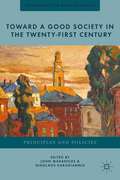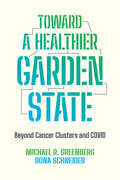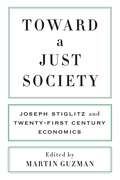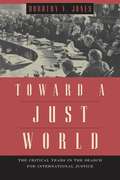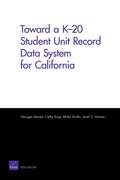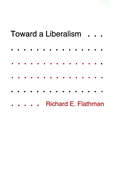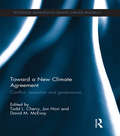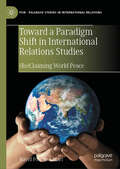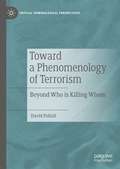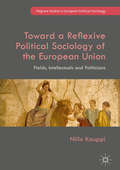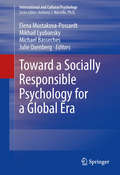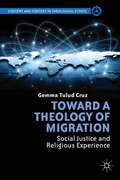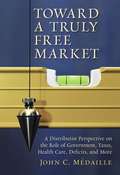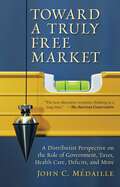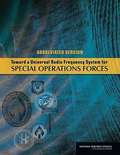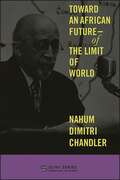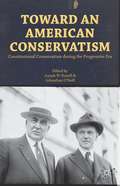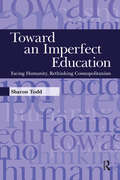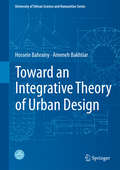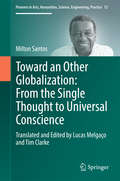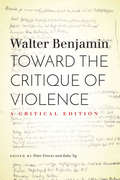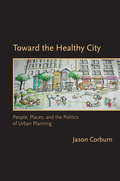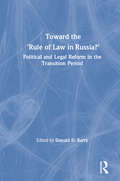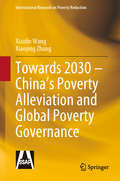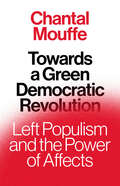- Table View
- List View
Toward a Good Society in the Twenty-First Century
by John Marangos Nikolaos KaragiannisHaving previously defined a good society as a sustainable society with a high level of development, significant provision of meaningful jobs, and low levels of inequality and social ills, Toward a Good Society in the Twenty-first Century provides a wide range of principles and policies that would be necessary if we are to achieve a good society. Marangos and Karagiannis have put together a comprehensive volume that explores the principles and policies needed to bring about the good society, and focuses on four broad themes which are deemed important towards achieving a good or better society: quality education and fair distribution; environmentally sustainable prosperity; inclusive economic development and significant job creation; and beneficial civic institutions, and deepening of freedom and time use. All these topics can be highly controversial and call for alternative perspectives on theoretical (philosophical) and policy grounds.
Toward a Healthier Garden State: Beyond Cancer Clusters and COVID
by Michael R. Greenberg Dona SchneiderWhile New Jersey now frequently appears near the top in listings of America’s healthiest states, this has not always been the case. The fluctuations in the state’s overall levels of health have less to do with the lifestyle choices of individual residents and more to do with broader structural issues, ranging from pollution to urban design to the consolidation of the health care industry. This book uses the past fifty years of New Jersey history as a case study to illustrate just how much public policy decisions and other upstream factors can affect the health of a state’s citizens. It reveals how economic and racial disparities in health care were exacerbated by bad policies regarding everything from zoning to education to environmental regulation. The study further chronicles how New Jersey struggled to deal with public health crises like the AIDS epidemic and the crack epidemic. Yet it also explores how the state has developed some of the nation’s most innovative responses to public health challenges, and then provides policy suggestions for how we might build an even healthier New Jersey.
Toward a Just Society: Joseph Stiglitz and Twenty-First Century Economics
by Martin GuzmanJoseph Stiglitz is one of the world’s greatest economists. He has made fundamental contributions to economic theory in areas such as inequality, the implications of imperfect and asymmetric information, and competition, and he has been a major figure in policy making, a leading public intellectual, and a remarkably influential teacher and mentor. This collection of essays influenced by Stiglitz’s work celebrates his career as a scholar and teacher and his aspiration to put economic knowledge in the service of creating a fairer world.Toward a Just Society brings together a range of essays whose breadth reflects how Stiglitz has shaped modern economics. The contributions to this volume, all penned by high-profile authors who have been guided by or collaborated with Stiglitz over the last five decades, span microeconomics, macroeconomics, inequality, development, law and economics, and public policy. Touching on many of the central debates and discoveries of the field and providing insights on the directions that academic economics could take in the future, Toward a Just Society is an extraordinary celebration of the many paths Stiglitz has opened for economics, politics, and public life.
Toward a Just World: The Critical Years in the Search for International Justice
by Dorothy V. Jones"Toward a Just World is an insightful and thoughtful history. The first half of the twentieth century and the heroic efforts of those who sought international justice during that time will be much better understood and appreciated thanks to this fascinating book. "—Robert F. Drinan, Georgetown University A century ago, there was no such thing as international justice, and until recently, the idea of permanent international courts and formal war crimes tribunals would have been almost unthinkable. Yet now we depend on institutions such as these to air and punish crimes against humanity, as we have seen in the International Criminal Tribunal for Rwanda and the appearance of Serbian leader Slobodan Milosevic before the Tribunal for the Former Yugoslavia. Toward a Just World tells the remarkable story of the long struggle to craft the concept of international justice that we have today. Dorothy V. Jones focuses on the first half of the twentieth century, the pivotal years in which justice took on expanded meaning in conjunction with ideas like world peace, human rights, and international law. Fashioning both political and legal history into a compelling narrative, Jones recovers little-known events from undeserved obscurity and helps us see with new eyes the pivotal ones that we think we know. Jones also covers many of the milestones in the history of diplomacy, from the Treaty of Versailles and the creation of the League of Nations to the Nuremberg war crimes tribunal and the making of the United Nations. As newspapers continue to fill their front pages with stories about how to administer justice to al Qaeda and Saddam Hussein, Toward a Just World will serve as a timely reminder of how the twentieth century achieved one of its most enduring triumphs: giving justice an international meaning.
Toward a K-20 Student Unit Record Data System for California
by Georges Vernez Janet S. Hansen Mirka Vuollo Cathy KropTo improve the progression of students through the educational system and to improve education quality, California needs a robust data system that can track an individual student's progress from kindergarten to college and beyond. The authors review California's multiple existing student data systems and identify steps that could be taken toward building and maintaining an integrated student data system for the state.
Toward a Liberalism
by Richard FlathmanIn Toward a Liberalism, Richard Flathman shows why and how political theory can contribute to the quality of moral and political practice without violating, as empiricist- and idealist-based theories tend to do, liberal commitments to individuality and plurality. Exploring the tense but inevitable relationship between liberalism and authority, he advances a theory of democratic citizenship tempered by appreciation of the ways in which citizenship is implicated with and augments authority. Flathman examines the relationship of individual rights to freedom on one hand and to authority and power on the other, rejecting the quest for a single homogenous and authoritative liberal theory.
Toward a New Climate Agreement: Conflict, Resolution and Governance (Routledge Advances in Climate Change Research)
by Jon Hovi David M. McEvoy Todd L. CherryClimate change is one of the most pressing problems facing the global community. Although most states agree that climate change is occurring and is at least partly the result of humans’ reliance on fossil fuels, managing a changing global climate is a formidable challenge. Underlying this challenge is the fact that states are sovereign, governed by their own laws and regulations. Sovereignty requires that states address global problems such as climate change on a voluntary basis, by negotiating international agreements. Despite a consensus on the need for global action, many questions remain concerning how a meaningful international climate agreement can be realized. This book brings together leading experts to speak to such questions and to offer promising ideas for the path toward a new climate agreement. Organized in three main parts, it examines the potential for meaningful climate cooperation. Part 1 explores sources of conflict that lead to barriers to an effective climate agreement. Part 2 investigates how different processes influence states’ prospects of resolving their differences and of reaching a climate agreement that is more effective than the current Kyoto Protocol. Finally, part 3 focuses on governance issues, including lessons learned from existing institutional structures. The book is unique in that it brings together the voices of experts from many disciplines, such as economics, political science, international law, and natural science. The authors are academics, practitioners, consultants and advisors. Contributions draw on a variety of methods, and include both theoretical and empirical studies. The book should be of interest to scholars and graduate students in the fields of economics, political science, environmental law, natural resources, earth sciences, sustainability, and many others. It is directly relevant for policy makers, stakeholders and climate change negotiators, offering insights into the role of uncertainty, fairness, policy linkage, burden sharing and alternative institutional designs.
Toward a Paradigm Shift in International Relations Studies: (Re)Claiming World Peace (Palgrave Studies in International Relations)
by Navid PourmokhtariThis book asks why the current IR paradigm has outlasted its utility and argues that despite changes to world politics, the paradigm of IR remains far more preoccupied with the dynamics of war and almost silent, when it comes to commenting on the conditions of lasting, global peace. Cognizant of the dominant paradigm’s supposed preoccupation with seeking peace, the author shows how IR’s mainstream discourses work to reproduce war.
Toward a Phenomenology of Terrorism: Beyond Who is Killing Whom (Critical Criminological Perspectives)
by David PolizziThis book examines the socio-psychological dynamics and drivers of terrorism from a humanistic perspective. Most interpret terrorism as meaningless, asocial violence but this book argues that it's not just a case of seeing 'who is killing whom' but that defining and understanding terrorism is configured by historical context and immediate experience. The author argues that these acts of terrorist violence can be interpreted as the external expression of repressed feelings and impulses that have been tabooized by mainstream society. Upon release, these terrorists gain a new 'nomos' which generates a sense of meaning and significance for them. This book draws on psycho-analytical theories of repression, Heideggerian existentialism, Berger’s anthropological concept of culture as ‘nomos’, and Roger Griffin’s analysis of terrorist fanaticism, adding to the understanding terrorism and criminality from a new perspective and beyond the usual literature situated in political science, security/war and peace studies. This book seeks to provide: a definition of terrorism, an account of the psychological theory, an explanation of the nomic dimension of terroristic violence, an exploration of the relevance of the new approach to understanding: Salafi jihadism, Al-Qaeda, Islamic State, the Taliban, White Supremacism, the rise of the Radical Right, and reflections on this for combating terrorism. It appeals to those interested in terrorism, conflict, terrorist radicalization and motivation, international relations, politics and religious politics, and to counter-terrorism agencies.
Toward a Reflexive Political Sociology of the European Union
by Niilo KauppiThis book argues that contemporary European politics creates new forms of transnational power that challenge the traditional parameters of the nation-state. Kauppi identifies and critically explores the evolving dynamics between national and transnational spaces, groups and knowledge, and suggests that European public policies and transnational institutions like the European Parliament create new spaces, types of knowledge and novel political practices. Toward a Reflexive Political Sociology of the European Union is structured around three parts. The first focuses on evolving transnational fields. The second explores the changing role of academics and universities. The third section engages with the works of Pierre Bourdieu on politics and the media. The issues discussed throughout the book revolve around the challenges to the nation-state and of knowledge production that is tied to it. This book will be an invaluable resource to academics and researchers interested in European politics, European Union studies and political sociology.
Toward a Socially Responsible Psychology for a Global Era
by Elena Mustakova-Possardt Mikhail Lyubansky Michael Basseches Julie OxenbergThis book explores the concept of "socially-responsible psychology in a global age" and how it might be used to organize, integrate and bring enhanced focus a field that has the potential to contribute to solutions to the world's most pressing problems. In this volume, the editors explore the central and defining features of socially-responsible psychology, challenges that this work would face, and the mechanisms and processes by which psychological work could be synergistically integrated with the work of other disciplines. For this purpose, the volume also examines a variety of factors currently that limit psychology in carrying out this goal.
Toward a Theology of Migration
by Gemma Tulud CruzAt no other time in the history of the world is the movement of people at such a large scale that scholars consider the current period as the age of migration. Beyond the density, velocity, and multi-directionality, however, the often conflicting and tragic nature of contemporary global migration makes a compelling case for theological reflection. The book explores the problems and possibilities that the experience of migrants brings to Christian theology by reflecting on the religious dimension as well as the social justice implications of the migrant experience. More specifically, the book reflects on the Christian vision of 'one bread, one body, one people' in view of the gifts and challenges of contemporary global migration to Christian systematic theology, social ethics, spirituality, mission, ministry, and inculturation based on the experience of refugees, unauthorized poor migrants, migrant workers, and migrant women.
Toward a Truly Free Market: A Distributist Perspective on the Role of Government, Taxes, Health Care, Deficits, and More
by John C. MedailleToward a Truly Free Market argues that any attempt to divorce economic equilibrium from economic equity will lead to an unbalanced economy--one that falls either to ruin or to ruinous government attempts to redress the balance.
Toward a Truly Free Market: A Distributist Perspective on the Role of Government, Taxes, Health Care, Deficits, and More
by John MedailleTaking "free markets" from rhetoric to reality For three decades free-market leaders have tried to reverse longstanding Keynesian economic policies, but have only produced larger government, greater debt, and more centralized economic power. So how can we achieve a truly free-market system, especially at this historical moment when capitalism seems to be in crisis? The answer, says John C. Medaille, is to stop pretending that economics is something on the order of the physical sciences; it must be a humane science, taking into account crucial social contexts. Toward a Truly Free Market argues that any attempt to divorce economic equilibrium from economic equity will lead to an unbalanced economy—one that falls either to ruin or to ruinous government attempts to redress the balance. Medaille makes a refreshingly clear case for the economic theory—and practice—known as distributism. Unlike many of his fellow distributists, who argue primarily from moral terms, Medaille enters the economic debate on purely economic terms. Toward a Truly Free Market shows exactly how to end the bailouts, reduce government budgets, reform the tax code, fix the health-care system, and much more.
Toward a Universal Radio Frequency System for Special Operations Forces
by National Research Council of the National AcademiesThe U.S. Special Operations Command (SOCOM) was formed in response to the failed rescue attempt in 1980 of American hostages held by Iran. Among its key responsibilities, SOCOM plans and synchronizes operations against terrorist networks. Special operations forces (SOF) often operate alone in austere environments with only the items they can carry, which makes equipment size, weight, and power needs especially important. Specialized radios and supporting equipment must be carried by the teams for their radio-frequency (RF) operations. As warfighting demands on SOCOM have intensified, SOCOM's needs for significantly improved radio-frequency (RF) systems have increased. Toward a Universal Radio Frequency System for Special Operations Forces examines the current state of the art for both handheld and manpackable platform-mounted RF systems, and determines which frequencies could be provided by handheld systems. The book also explores whether or not a system that fulfills SOF's unique requirements could be deployed in a reasonable time period. Several recommendations are included to address these and other issues.
Toward an African Future—Of the Limit of World (SUNY series, Literature... in Theory)
by Nahum Dimitri ChandlerExamines the thought of W. E. B. Du Bois, with attention to its potential for reorienting present-day critical theory and political philosophy.Widely known for his probing analysis of W. E. B. Du Bois's early work, in this book Nahum Dimitri Chandler references writing from across the whole of Du Bois's long career, while bringing sharp focus on two later texts issued in the immediate aftermath of World War II-Color and Democracy: Colonies and Peace and The World and Africa: An Inquiry into the Part which Africa Has Played in World History. In these texts, "the problem of the color line," which Du Bois had already characterized as the problem not only of the twentieth century, but of the modern epoch as a whole, is further figured as a global problem, as a horizon linking the contemporary conjuncture of the history of modern systems of enslavement with the ongoing impact of modern colonialism and imperialism on the world's possible futures. On this line of thought, Chandler proposes that the name of "Africa" is a theoretical metaphor that enables a hyperbolic re-narrativization of modern historicity. Du Bois thus emerges as an exemplary thinker of history and hope for the world beyond the limit of the present.
Toward an American Conservatism: Constitutional Conservatism during the Progressive Era
by Joseph Postell Johnathan O’neilDuring the Progressive Era (1880-1920), leading thinkers and politicians transformed American politics. Historians and political scientists have given a great deal of attention to the progressives who effected this transformation. Yet relatively little is known about the conservatives who opposed these progressive innovations, despite the fact that they played a major role in the debates and outcomes of this period of American history. These early conservatives represent a now-forgotten source of inspiration for modern American conservatism. This volume gives these constitutional conservatives their first full explanation and demonstrates their ongoing relevance to contemporary American conservatism.
Toward an Imperfect Education: Facing Humanity, Rethinking Cosmopolitanism (Interventions: Education, Philosophy, And Culture Ser.)
by Sharon ToddThe theory of cosmopolitanism is built on a paradoxical commitment to a universal idea of humanity and to a respect for human pluralism. Toward an Imperfect Education critiques the assumed "goodness" of humans that underwrites the idea of humanity and explores how antagonistic human interactions such as conflict, violence, and suffering are a fundamental aspect of life in a pluralistic world. This book proposes that the inescapable difference between humans compels our ethical and political observations in education. Todd persuasively argues that facing humanity in all its complexity and imperfection ought to be a central element of the cosmopolitan project to create a more just and humane education. Informed primarily by poststructural philosophy and feminist theory, she focuses on how sexual, cultural, and religious difference intersect with universal claims made in the name of humanity. Individual chapters develop a novel framework for dealing with antagonism in relation to human rights, democracy, citizenship, and cross-cultural understanding.
Toward an Integrative Theory of Urban Design
by Hossein Bahrainy Ameneh BakhtiarThis book takes a bold epistemological approach to address the fundamental questions that urban design has faced since its inception - questions concerning its legitimacy, definition, nature, content, purpose, theory, methods, jurisdiction and above all its knowledge base. The appropriate level of urban design - global or local - is another critical and emerging question discussed. At the end, an integrative theory of urban design is introduced, on the basis of which a set of principles is developed for application by practicing urban designers. These principles are presented at three essential levels: general, global and local-Iranian. Toward an Integrative Theory of Urban Design is intended to dispel many of the ambiguities still troubling urban design as a discipline and profession.
Toward an Other Globalization: From the Single Thought to Universal Conscience
by Milton SantosThis book presents an alternative theory of globalization that derives not from the dominant perspective of the West, from which this process emerged, but from the critical vantage point of the Third World, which has borne the heaviest burdens of globalization. It offers a critical and uniquely first-hand perspective that is lacking not only from the apologists of Western hegemony, but from most scholars writing against this hegemony from within the globalizing world. Renowned throughout Latin America and parts of Europe, the author, Brazilian geographer Milton Santos, has long been for the most part inaccessible to the English-speaking world. Only one of his books, The Shared Space: The Two Circuits of the Urban Economy in Underdeveloped Countries, published in 1975, has been translated into English; nevertheless, the works of Santos's most important phase, from the 1980s until his death in 2001, have remained unavailable to English readers. With the translation of Toward an Other Globalization, one of the last works published in Santos's lifetime, this situation has finally been rectified. In this book, Santos argues that we must consider globalization in three different senses: globalization as a fable (the world as globalizing agents make us believe), as perversity (the world as it is presently, in the throes of globalization), and as possibility (the world as it could be). What emerges from the analysis of these three senses is an alternative theory of globalization rooted in the perspective of the so-called Global South. Santos concludes his text with a message that is optimistic, but in no way naïve. What he offers instead is a revolutionary optimism and, indeed, an other globalization.
Toward the Critique of Violence: A Critical Edition
by Walter BenjaminMarking the centenary of Walter Benjamin's immensely influential essay, "Toward the Critique of Violence," this critical edition presents readers with an altogether new, fully annotated translation of a work that is widely recognized as a classic of modern political theory. The volume includes twenty-one notes and fragments by Benjamin along with passages from all of the contemporaneous texts to which his essay refers. Readers thus encounter for the first time in English provocative arguments about law and violence advanced by Hermann Cohen, Kurt Hiller, Erich Unger, and Emil Lederer. A new translation of selections from Georges Sorel's Reflections on Violence further illuminates Benjamin's critical program. The volume also includes, for the first time in any language, a bibliography Benjamin drafted for the expansion of the essay and the development of a corresponding philosophy of law. An extensive introduction and afterword provide additional context. With its challenging argument concerning violence, law, and justice—which addresses such topical matters as police violence, the death penalty, and the ambiguous force of religion—Benjamin's work is as important today as it was upon its publication in Weimar Germany a century ago.
Toward the Healthy City: People, Places, and the Politics of Urban Planning (Urban and Industrial Environments)
by Jason CorburnA call to reconnect the fields of urban planning and public health that offers a new decision-making framework for healthy city planning.In distressed urban neighborhoods where residential segregation concentrates poverty, liquor stores outnumber supermarkets, toxic sites are next to playgrounds, and more money is spent on prisons than schools, residents also suffer disproportionately from disease and premature death. Recognizing that city environments and the planning processes that shape them are powerful determinants of population health, urban planners today are beginning to take on the added challenge of revitalizing neglected urban neighborhoods in ways that improve health and promote greater equity. In Toward the Healthy City, Jason Corburn argues that city planning must return to its roots in public health and social justice. The first book to provide a detailed account of how city planning and public health practices can reconnect to address health disparities, Toward the Healthy City offers a new decision-making framework called “healthy city planning” that reframes traditional planning and development issues and offers a new scientific evidence base for participatory action, coalition building, and ongoing monitoring. To show healthy city planning in action, Corburn examines collaborations between government agencies and community coalitions in the San Francisco Bay area, including efforts to link environmental justice, residents' chronic illnesses, housing and real estate development projects, and planning processes with public health. Initiatives like these, Corburn points out, go well beyond recent attempts by urban planners to promote public health by changing the design of cities to encourage physical activity. Corburn argues for a broader conception of healthy urban governance that addresses the root causes of health inequities.
Toward the Rule of Law in Russia: Political and Legal Reform in the Transition Period
by Donald D. BarryThe contributors to this volume - all specialists on Soviet law and politics - offer a comprehensive examination of the effort to create a "law-based" state in the Gorbachev-era U.S.S.R., thus effecting a fundamental change in the relationship between the state and private groups and individuals. Gianmaria Ajani, Donald Barry, Harold Berman, Frances Foster-Simons, George Ginsburgs, John Hazard, Kathryn Hendley, Eugene Huskey, Dietrich Loeber, Peter Maggs, Hiroshi Oda, Nicolai Petro, Robert Sharlet, Louise Shelley, Will Simons and Peter Solomon, with commentary by Soviet scholars, discuss conceptual, historical, social, cultural, and institutional aspects of Soviet legal development, and supply detailed analysis of recent developments in the areas of civil, criminal, and labour law and the rights of individuals, economic organizations, and political and social groups.
Towards 2030 – China’s Poverty Alleviation and Global Poverty Governance (International Research on Poverty Reduction)
by Xiaolin Wang Xiaoying ZhangThis book assesses the global significance of China’s decade-long campaign to reduce poverty. After showing how the country’s unique approach to poverty alleviation brought about unparalleled progress toward achieving both the Millennium Development Goals (MDGs) and the Sustainable Development Goals (SDGs), the authors shed light on how China’s experience can help other countries around the globe as they try to permanently rid humanity of the scourge of poverty under ever more challenging social, economic and environmental conditions.
Towards A Green Democratic Revolution: Left Populism and the Power of Affects
by Chantal MouffeHow to rebuilt left populism around the demands for the Green Democratic RevolutionIn recent years, the promises of the populist moment have faltered, as seen in the defeats of Jeremy Corbyn, Bernie Sanders, Jean-Luc Melenchon. In addition, the pandemic has brought about a strong need for protection, creating a favorable terrain for authoritarian forms of politics. This new situation represents a challenge for the left, whose rationalism and modernist idea of progress is rightly suspicious of such demands. How, therefore, can the left deal with the economic, social and ecological crisis that the pandemic has brought to the fore?Chantal Mouffe argues that the left should not underestimate the importance of affects when developing a strategy for political change. In fact, after years of &‘post-politics&’, we are witnessing a &‘return of the political&’. And in response Mouffe proposes the creation of a broad coalition of movements under the banner of a 'Green Democratic Revolution'. This entails the protection of society and its material conditions in a way that empowers people instead of making them retreat in a defensive nationalism or in a passive acceptance of technological solutions. It is protection for the many, not the few, providing social justice and fostering solidarity.Towards A Green Democratic Revolution is a bold rallying cry for political organisation in the post-pandemic era.
